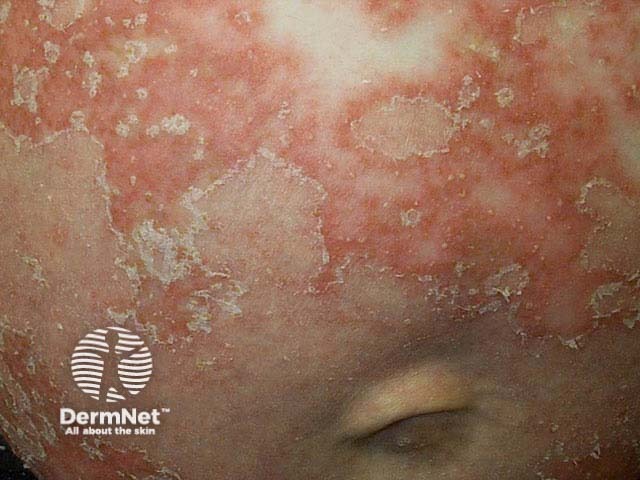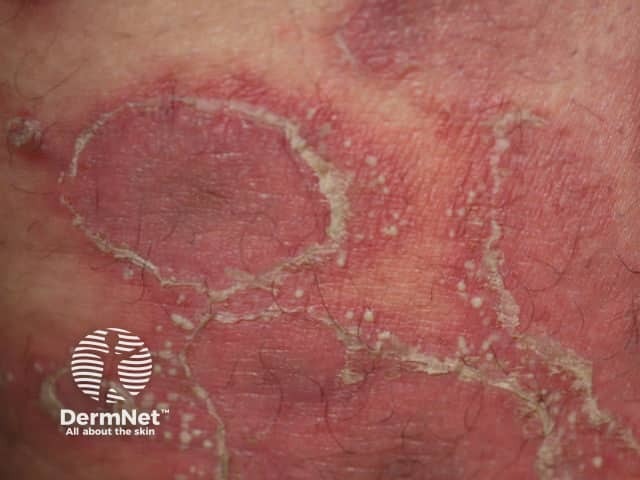Main menu
Common skin conditions

NEWS
Join DermNet PRO
Read more
Quick links
Pustular psoriasis of pregnancy — extra information
Pustular psoriasis of pregnancy
Author: Dr Selene Ting, Medical Registrar, Counties Manukau District Health Board, Auckland, New Zealand. Copy edited by Gus Mitchell. March 2021
Introduction Demographics Causes Clinical features Complications Diagnosis Differential diagnoses Treatment Outcome
What is pustular psoriasis of pregnancy?
Pustular psoriasis of pregnancy, also known as impetigo herpetiformis, is a rare variant of generalised pustular psoriasis that occurs in pregnancy.


Generalised pustular psoriasis
Who gets pustular psoriasis of pregnancy?
Pustular psoriasis of pregnancy typically appears in the third trimester of pregnancy and resolves rapidly after delivery, although the timing of onset can range from the first trimester to the immediate post-partum period. It can recur in subsequent pregnancies, often at an earlier stage. Pustular psoriasis of pregnancy has also been reported with oral contraceptive use and the menstrual cycle. Many women who develop pustular psoriasis of pregnancy have a personal or family history of psoriasis.
What causes pustular psoriasis of pregnancy?
The pathogenesis of pustular psoriasis of pregnancy is unclear. Postulated triggers on a predisposing genetic background such as IL36RN gene mutation include:
- Increased progesterone levels
- Hypocalcaemia, low vitamin D level, hypoparathyroidism
- Low elafin levels (an epidermal skin-derived antileukoproteinase).
What are the clinical features of pustular psoriasis of pregnancy?
Pustular psoriasis of pregnancy presents as symmetrical annular or polycyclic erythematous patches and plaques, with the formation of sterile pustules at the periphery, beginning in skin folds and spreading to the extremities and trunk. The pustules rapidly merge to form large plaques with desquamation and red-brown pigmentation. The face, palms, and soles are usually spared. The oral mucosa is sometimes involved with pustules that leave circinate or erosive lesions on the tongue or buccal mucosa.
Pustular psoriasis of pregnancy is often accompanied by constitutional symptoms which may include fever, malaise, nausea and diarrhoea, arthralgias, tachycardia, delirium, and seizures.
What are the complications of pustular psoriasis of pregnancy?
- Erythroderma
- Fluid and electrolyte imbalance
- Impaired thermoregulation
- Hypoalbuminaemia
- Maternal sepsis
- Death due to cardiac or renal failure
- Placental insufficiency
- Intrauterine growth retardation
- Miscarriage/stillbirth
How is pustular psoriasis of pregnancy diagnosed?
Pustular psoriasis of pregnancy should be considered in a pregnant woman with a spreading pustular skin rash and constitutional symptoms. Investigations may include:
- Microbiology of a pustule swab for bacteriology, virology, and mycology, usually negative
- Blood tests — increased white blood cells, elevated ESR/CRP, check calcium, phosphate, and albumin which may be reduced
- Skin biopsy — shows the same histological features as other forms of pustular psoriasis; intraepidermal pustules, epidermal acanthosis in older lesions, neutrophil infiltrate of upper dermis, subcorneal spongiform pustules of Kogoj, scale crust of neutrophils, and parakeratotic layers.
What is the differential diagnosis for pustular psoriasis of pregnancy?
- Acute generalised exanthematous pustulosis (AGEP)
- Pemphigoid gestationis
- Subcorneal pustular dermatosis
What is the treatment for pustular psoriasis of pregnancy?
General measures
- Emollients
- Intravenous fluids and electrolytes
- Adequate analgesia
- Careful monitoring of mother and fetus is essential.
Specific measures
- Narrowband UVB phototherapy
- Systemic corticosteroid
- Ciclosporin
- Tumour necrosis factor-alpha inhibitors such as infliximab.
Early delivery should be considered in severe disease as pustular psoriasis of pregnancy can be life-threatening yet typically resolves rapidly postpartum.
What is the outcome for pustular psoriasis of pregnancy?
Pustular psoriasis of pregnancy usually settles quickly after delivery of the baby, although some changes of psoriasis may persist long-term.
Pustular psoriasis of pregnancy can recur with subsequent pregnancies, and may present earlier in the next pregnancy and in a more severe form.
Pustular psoriasis of pregnancy carries a poor prognosis for mother and/or fetus if untreated.
Bibliography
- Benjegerdes KE, Hyde K, Kivelevitch D, Mansouri B. Pustular psoriasis: pathophysiology and current treatment perspectives. Psoriasis (Auckl). 2016;6:131-44. doi:10.2147/PTT.S98954. Journal
- Flynn A, Burke N, Byrne B, Gleeson N, Wynne B, Barnes L. Two case reports of generalized pustular psoriasis of pregnancy: different outcomes. Obstet Med. 2016;9(2):55-9. doi:10.1177/1753495X15626623. PubMed Central
- Namazi N, Dadkhahfar S. Impetigo herpetiformis: review of pathogenesis, complication, and treatment. Dermatol Res Pract. 2018;2018:5801280. doi:10.1155/2018/5801280. Journal
- Patterson JW. Weedon’s Skin Pathology, 5th edn. Elsevier 2020, pp109-11.
- Trivedi MK, Vaughn AR, Murase JE. Pustular psoriasis of pregnancy: current perspectives. Int J Womens Health. 2018;10:109–15. doi:10.2147/IJWH.S125784. Journal
On DermNet
- Acute forms of psoriasis
- Erythrodermic psoriasis
- Drug-induced psoriasis
- Fever and a rash
- Generalised pustular psoriasis
- Guidelines for the management of psoriasis
- Psoriasis
- Skin changes in pregnancy
- Systemic therapy for psoriasis
Other websites
- Pregnancy Dermatoses — American Academy of Dermatology
- Pustular Psoriasis — American Academy of Dermatology
